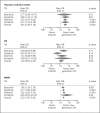Ponatinib in the Treatment of Chronic Myeloid Leukemia and Philadelphia Chromosome-Positive Acute Leukemia: Recommendations of a German Expert Consensus Panel with Focus on Cardiovascular Management
- PMID: 31590170
- PMCID: PMC7384349
- DOI: 10.1159/000501927
Ponatinib in the Treatment of Chronic Myeloid Leukemia and Philadelphia Chromosome-Positive Acute Leukemia: Recommendations of a German Expert Consensus Panel with Focus on Cardiovascular Management
Abstract
Treatment of chronic myeloid leukemia (CML) and Philadelphia chromosome-positive acute leukemia (Ph+ ALL) has been revolutionized with the advent of tyrosine kinase inhibitors (TKIs). Most patients with CML achieve long-term survival similar to individuals without CML due to treatment with TKIs not only in frontline but also in further lines of therapy. The third-generation TKI ponatinib has demonstrated efficacy in patients with refractory CML and Ph+ ALL. Ponatinib is currently the most potent TKI in this setting demonstrating activity against T315I mutant clones. However, ponatinib's safety data revealed a dose-dependent, increased risk of serious cardiovascular (CV) events. Guidance is needed to evaluate the benefit-risk profile of TKIs, such as ponatinib, and safety measures to prevent treatment-associated CV events. An expert panel of German hematologists and cardiologists summarize current evidence regarding ponatinib's efficacy and CV safety profile. We propose CV management strategies for patients who are candidates for ponatinib.
Keywords: Cardiovascular management; Chronic myeloid leukemia; Consensus paper; Philadelphia chromosome-positive acute leukemia; Ponatinib; Tyrosine kinase inhibitor.
© 2019 The Author(s) Published by S. Karger AG, Basel.
Conflict of interest statement
S.S.: advisory role for Novartis, Bristol-Myers Squibb, Pfizer, and Incyte; received research funding from Novartis, Bristol-Myers Squibb, and Incyte. F.L.: advisory role for Novartis, Ariad, Incyte, Celgene, Sanofi Aventis, and Bristol-Myers Squibb; receives support from the Frankfurter Förderung “Nachwuchswissenschaftler” and the EUTOS funding program; received funding from Novartis. S.K.: advisory board: Pfizer, Incyte, Ariad, Novartis, and Bristol-Myers Squibb; received honoraria from Pfizer, Incyte, Ariad, and Novartis; received research funding from Novartis, Pfizer, and Bristol-Myers Squibb and travel support from Pfizer, Incyte, Ariad, Novartis, and Bristol-Myers Squibb. W.H.: received honoraria for lectures from Ariad. A.K.: received honoraria for lectures and consulting services for Novartis, Bristol-Myers Squibb, and Pfizer. K.J.-U. and C.F.W.: no conflicts of interest to declare. F.S.: advisory board: Incyte, Novartis, and Pfizer; received speaker honoraria from Bristol-Myers Squibb, Novartis, and Pfizer and travel support from Bristol-Myers Squibb and Novartis. H.P.: advisory board: Incyte; received travel support and honoraria from Incyte, Amgen, Novartis, and Jazz Pharmaceuticals. P.R.: advisory board: Novartis, Bristol-Myers Squibb, Incyte, and Pfizer; received research funding and congress/travel support from Novartis and Bristol-Myers Squibb. N.G.: advisory board: Incyte and Novartis; received research support from Incyte and Novartis. C.R.: received honoraria for consulting services from AbbVie, Astellas, Basilea, Bayer, Boehringer Ingelheim, Bristol-Myers Squibb, Gilead Sciences, GlaxoSmithKline Germany, Incyte, Janssen-Cilag, Pfizer, Merck, Novartis, Roche, Takeda, and Shire. G.-N.F.: received honoraria and research funding from Novartis and honoraria from Incyte and Pfizer. P.C.: received speaker honoraria from Incyte, Novartis, Bristol-Myers Squibb, and Pfizer. R.K.: received research grant from Ariad. C.J.: received financial support for research, honoraria for scientific advisory activity, and speaker honoraria from Incyte.
Figures


Similar articles
-
Ponatinib: A new tyrosine kinase inhibitor for the treatment of chronic myeloid leukemia and Philadelphia chromosome-positive acute lymphoblastic leukemia.Ann Pharmacother. 2013 Nov;47(11):1540-6. doi: 10.1177/1060028013501144. Epub 2013 Nov 21. Ann Pharmacother. 2013. PMID: 24265264 Review.
-
Clinical outcomes in patients with Philadelphia chromosome-positive leukemia treated with ponatinib in routine clinical practice-data from a Belgian registry.Ann Hematol. 2021 Jul;100(7):1723-1732. doi: 10.1007/s00277-021-04507-x. Epub 2021 May 4. Ann Hematol. 2021. PMID: 33942128 Free PMC article.
-
Ponatinib in the treatment of chronic myeloid leukemia and philadelphia chromosome positive acute lymphoblastic leukemia.Future Oncol. 2019 Jan;15(3):257-269. doi: 10.2217/fon-2018-0371. Epub 2018 Sep 25. Future Oncol. 2019. PMID: 30251548 Review.
-
Efficacy and safety of ponatinib for patients with Philadelphia chromosome-positive acute lymphoblastic leukemia: a case series from a single institute.Int J Hematol. 2021 Aug;114(2):199-204. doi: 10.1007/s12185-021-03156-0. Epub 2021 Apr 27. Int J Hematol. 2021. PMID: 33907977
-
Ponatinib in refractory Philadelphia chromosome-positive leukemias.N Engl J Med. 2012 Nov 29;367(22):2075-88. doi: 10.1056/NEJMoa1205127. N Engl J Med. 2012. PMID: 23190221 Free PMC article. Clinical Trial.
Cited by
-
Current Treatment Options for Chronic Myeloid Leukemia Patients Failing Second-Generation Tyrosine Kinase Inhibitors.J Clin Med. 2020 Jul 15;9(7):2251. doi: 10.3390/jcm9072251. J Clin Med. 2020. PMID: 32679880 Free PMC article. Review.
-
Chronic Myeloid Leukemia Prognosis and Therapy: Criticisms and Perspectives.J Clin Med. 2020 Jun 2;9(6):1709. doi: 10.3390/jcm9061709. J Clin Med. 2020. PMID: 32498406 Free PMC article.
-
I13 overrides resistance mediated by the T315I mutation in chronic myeloid leukemia by direct BCR-ABL inhibition.Front Pharmacol. 2023 Apr 12;14:1183052. doi: 10.3389/fphar.2023.1183052. eCollection 2023. Front Pharmacol. 2023. PMID: 37124196 Free PMC article.
-
PBA2, a novel inhibitor of the β-catenin/CBP pathway, eradicates chronic myeloid leukemia including BCR-ABL T315I mutation.Mol Cancer. 2024 Sep 28;23(1):209. doi: 10.1186/s12943-024-02129-1. Mol Cancer. 2024. PMID: 39342174 Free PMC article.
-
Therapeutic options for chronic myeloid leukemia following the failure of second-generation tyrosine kinase inhibitor therapy.Front Oncol. 2024 Jul 29;14:1446517. doi: 10.3389/fonc.2024.1446517. eCollection 2024. Front Oncol. 2024. PMID: 39139284 Free PMC article. Review.
References
-
- Iclusig® Summary of Product Characteristics dated September. 2018.
-
- Soverini S, Bavaro L, Martelli M, De Benedittis C, Iurlo A, Orofino N, et al. Compound BCR-ABL1 Kinase Domain Mutants: Prevalence, Spectrum and Correlation with Tyrosine Kinase Inhibitor Resistance in a Prospective Series of Philadelphia Chromosome-Positive Leukemia Patients Analyzed By Next Generation Sequencing [ASH 2018, abstract 789] Blood. 2018;132(suppl 1):789.
-
- Lipton JH, Bryden P, Sidhu MK, Huang H, McGarry LJ, Lustgarten S, et al. Comparative efficacy of tyrosine kinase inhibitor treatments in the third-line setting, for chronic-phase chronic myelogenous leukemia after failure of second-generation tyrosine kinase inhibitors. Leuk Res. 2015 Jan;39((1)):58–64. - PubMed
Publication types
MeSH terms
Substances
LinkOut - more resources
Full Text Sources
Medical

